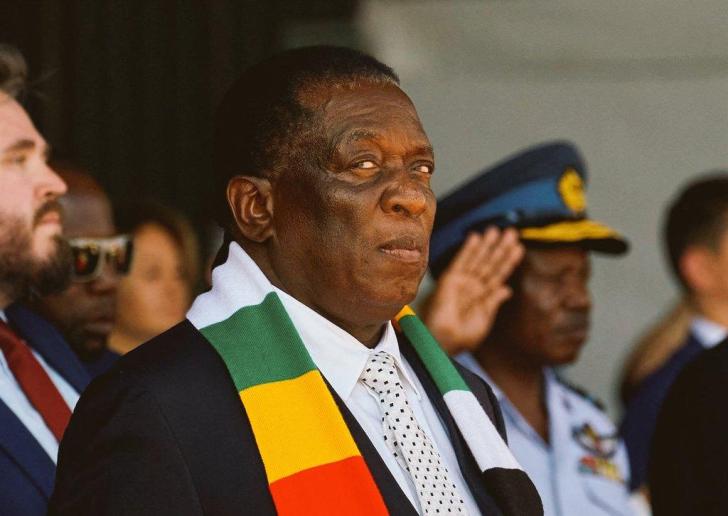News / Local
Mnangagwa walks tightrope in fresh diplomatic offensive
24 May 2025 at 10:00hrs |
0 Views

President Emmerson Mnangagwa's latest diplomatic engagements with Russia and Belarus have reignited debate over Zimbabwe's foreign policy, with experts questioning the efficacy of the country's pivot towards Eastern allies while simultaneously seeking improved relations with the West.
Earlier this month, Mnangagwa visited Belarus for talks with President Alexander Lukashenko, in a bid to deepen bilateral ties and expand cooperation. He also held high-level meetings in Moscow, with officials stating the focus was on broadening economic collaboration and diversifying partnerships.
However, critics argue that these efforts contradict Mnangagwa's ongoing attempts to re-engage with the West, including his administration's pursuit of Commonwealth readmission and thawing tensions with the United States.
"Mnangagwa's trips to Russia and Belarus are unlikely to bring significant change," said Ricky Mukonza, Associate Professor of Public Affairs at Tshwane University of Technology. "Belarus, ranked 74th in the global economy, faces its own internal challenges. Russia, entangled in the war in Ukraine, has limited capacity to prioritise peripheral alliances like Zimbabwe."
Mukonza added that Zimbabwe's global charm offensive remains hollow without substantive domestic reform.
"The ‘Zimbabwe is open for business' slogan rings empty when corruption, political repression, and electoral controversies persist," he said. "You cannot market a damaged product. Zimbabwe must fix itself first."
Yet others argue that Zimbabwe is within its rights to pursue a multipolar foreign policy. Political analyst Kudzai Mutisi defended the government's eastward overtures, citing historical solidarity and strategic diversification.
"Zimbabwe is a sovereign state. It has every right to engage with partners of its choosing," Mutisi said. "Western countries, including EU members, continue doing business with Russia. When Zimbabwe was isolated, Russia and Belarus stood by us. That history cannot be overlooked."
Mutisi insisted that enduring relationships with Eastern allies would remain a pillar of Zimbabwe's foreign policy.
Still, some analysts warn that Mnangagwa is treading a dangerous diplomatic tightrope. Political commentator Tendai Reuben Mbofana noted the potential contradictions in Zimbabwe's approach.
"You can't straddle both sides in today's polarised geopolitical landscape," Mbofana said. "Zimbabwe lifted tariffs on American imports, signalled a policy reset with Washington — then Mnangagwa is seen shaking hands with Putin. That's a mixed message."
Mbofana cautioned that the United States — particularly under former president Donald Trump, now back in the White House — may soon demand a clearer declaration of allegiance.
"Washington will eventually ask: Whose side are you on?"
While some observers believe Trump's warmer stance towards Putin could provide diplomatic leeway, others say it's too early to predict the impact on Zimbabwe's position.
Following Mnangagwa's visit, the Kremlin described Zimbabwe as a "reliable partner in Africa" and celebrated 45 years of diplomatic ties. The two countries pledged closer collaboration in trade and humanitarian sectors. However, the economic payoff remains uncertain.
"Symbolic gestures don't equal economic revival," Mukonza said. "Russia's presence in Zimbabwe is still modest — particularly when compared to China or other key players on the continent."
Despite the rhetoric of strategic realignment, Mnangagwa's foreign policy appears stuck between ideological nostalgia and geopolitical pragmatism — with real economic dividends yet to materialise.
Earlier this month, Mnangagwa visited Belarus for talks with President Alexander Lukashenko, in a bid to deepen bilateral ties and expand cooperation. He also held high-level meetings in Moscow, with officials stating the focus was on broadening economic collaboration and diversifying partnerships.
However, critics argue that these efforts contradict Mnangagwa's ongoing attempts to re-engage with the West, including his administration's pursuit of Commonwealth readmission and thawing tensions with the United States.
"Mnangagwa's trips to Russia and Belarus are unlikely to bring significant change," said Ricky Mukonza, Associate Professor of Public Affairs at Tshwane University of Technology. "Belarus, ranked 74th in the global economy, faces its own internal challenges. Russia, entangled in the war in Ukraine, has limited capacity to prioritise peripheral alliances like Zimbabwe."
Mukonza added that Zimbabwe's global charm offensive remains hollow without substantive domestic reform.
"The ‘Zimbabwe is open for business' slogan rings empty when corruption, political repression, and electoral controversies persist," he said. "You cannot market a damaged product. Zimbabwe must fix itself first."
Yet others argue that Zimbabwe is within its rights to pursue a multipolar foreign policy. Political analyst Kudzai Mutisi defended the government's eastward overtures, citing historical solidarity and strategic diversification.
"Zimbabwe is a sovereign state. It has every right to engage with partners of its choosing," Mutisi said. "Western countries, including EU members, continue doing business with Russia. When Zimbabwe was isolated, Russia and Belarus stood by us. That history cannot be overlooked."
Still, some analysts warn that Mnangagwa is treading a dangerous diplomatic tightrope. Political commentator Tendai Reuben Mbofana noted the potential contradictions in Zimbabwe's approach.
"You can't straddle both sides in today's polarised geopolitical landscape," Mbofana said. "Zimbabwe lifted tariffs on American imports, signalled a policy reset with Washington — then Mnangagwa is seen shaking hands with Putin. That's a mixed message."
Mbofana cautioned that the United States — particularly under former president Donald Trump, now back in the White House — may soon demand a clearer declaration of allegiance.
"Washington will eventually ask: Whose side are you on?"
While some observers believe Trump's warmer stance towards Putin could provide diplomatic leeway, others say it's too early to predict the impact on Zimbabwe's position.
Following Mnangagwa's visit, the Kremlin described Zimbabwe as a "reliable partner in Africa" and celebrated 45 years of diplomatic ties. The two countries pledged closer collaboration in trade and humanitarian sectors. However, the economic payoff remains uncertain.
"Symbolic gestures don't equal economic revival," Mukonza said. "Russia's presence in Zimbabwe is still modest — particularly when compared to China or other key players on the continent."
Despite the rhetoric of strategic realignment, Mnangagwa's foreign policy appears stuck between ideological nostalgia and geopolitical pragmatism — with real economic dividends yet to materialise.
Source - online
Join the discussion
Loading comments…































